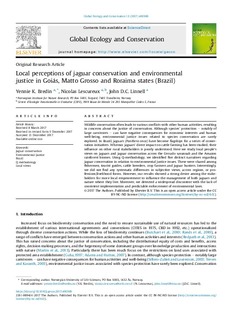Local perceptions of jaguar conservation and environmental justice in Goiás, Matto Grosso and Roraima states (Brazil)
Journal article, Peer reviewed
Published version

Åpne
Permanent lenke
http://hdl.handle.net/11250/2490999Utgivelsesdato
2017Metadata
Vis full innførselSamlinger
- Publikasjoner fra CRIStin - NINA [2364]
- Scientific publications [1392]
Originalversjon
10.1016/j.gecco.2017.e00369Sammendrag
Wildlife conservation often leads to various conflicts with other human activities, resulting in concerns about the justice of conservation. Although species' protection e notably of large carnivores e can have negative consequences for economic interests and human well-being, environmental justice issues related to species conservation are rarely explored. In Brazil, jaguars (Panthera onca) have become flagships for a series of conservation initiatives. Whereas jaguars' direct impact on cattle farming has been studied, their influence on other rural stakeholders is poorly understood. Here we study local people's views on jaguars and jaguar conservation across the Cerrado savannah and the Amazon rainforest biomes. Using Q-methodology, we identified five distinct narratives regarding jaguar conservation in relation to environmental justice issues. These were shared among fishermen, tourist guides, cattle breeders, crop farmers and jaguar hunters. Interestingly, we did not find any systematic differences in subjective views, across regions, or professions/ livelihood forms. However, our results showed a strong desire among the stakeholders for more local empowerment to influence the management of both jaguars and nature where they live. Moreover, we detected a widespread discontent with the lack of consistent implementation and predictable enforcement of environmental laws.
